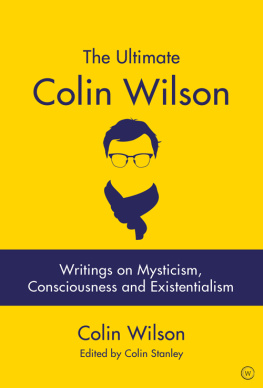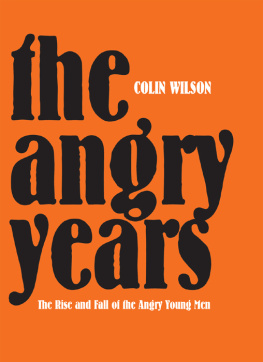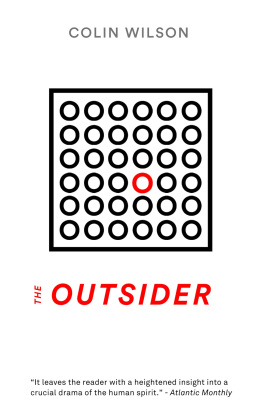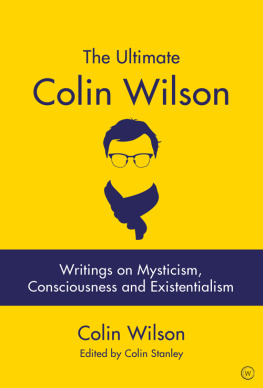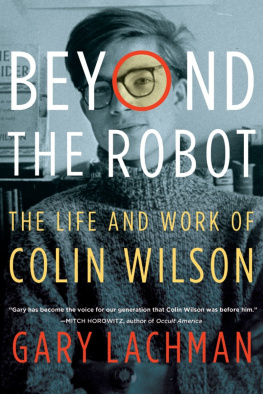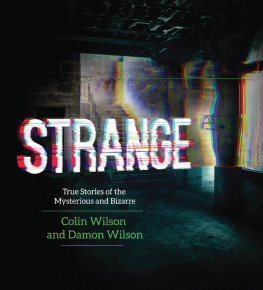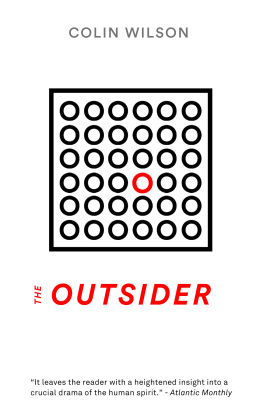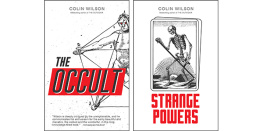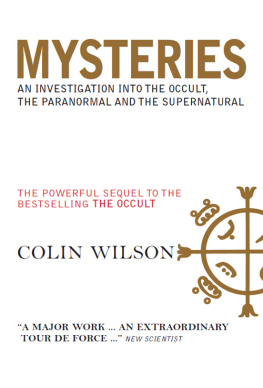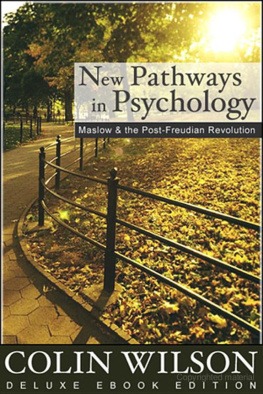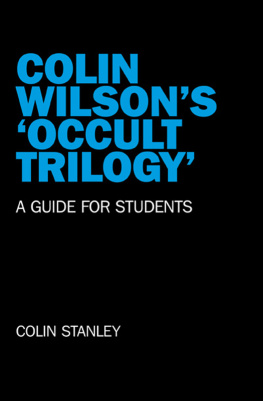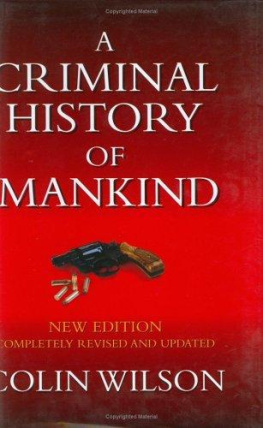Appendix One
The Man Who Saw the Future, Colin Wilson and T. C. Lethbridge: A Personal Appreciation
Terry Welbourn
Described by its curator as, Three Dementianal (sic) Nights of Barbarian Rock n Roll, Julian Copes Rome Wasnt Burned in ADay, held at the Hammersmith Lyric in the autumn of 2003, culminated on 1st November with an event dedicated to the archaeologist and psychic investigator T.C. Lethbridge. As a guest of the musical collective known as The Sons of TC-Lethbridge, Colin Wilson delivered an entertaining lecture citing Lethbridge as, One of the most wide-ranging and originalminds in modern parapsychology. (Wilson 1978, p.46).
During his presentation, Wilson described how Lethbridge demonstrated his own potential for greatness that was akin to his own belief that man was at the centre of his own destiny. He described parallels between his own life and that of Lethbridge. In 1957, Routledge and Kegan Paul published Lethbridges Gogmagog - The Buried Gods. The book documented Lethbridges controversial discovery of chalk hill figures on the slopes of Wandlebury Camp, Cambridgeshire. The publication was to prove to be his most controversial work to-date and was destined to change the course of his life. The previous year had seen Wilson make his own headlines when The Outsider published by Victor Gollancz appeared in bookshops across the country and propelled him too into the media spotlight. The two writers had independently ignited contentious careers that would ultimately lead to their names being inextricably linked.
As a result of the storm in academia caused by the publication of Gogmagog, Lethbridge felt compelled to leave his home in Cambridge and move to Hole House in the Devonshire village of Branscombe. It is likely that Wilson perceived Lethbridge as a like-mind, for he too had found the need to move to the West Country to escape the hostile glare of the media that misguidedly labelled him as one of the Angry Young Men alongside the likes of John Osborne, John Braine and Kingsley Amis in the late 1950s. As Wilson pointed out in his lecture: this label was absurd as he was not angry at all, but when offered 500 for an interview on the subject he found it quite easy to think of something to be angry about! (Wilson 2003).
Wilsons lecture at the Hammersmith Lyric commemorated the release of A Giant: The Definitive T.C. Lethbridge a double CD long-box set that included a 36-page booklet containing a new Lethbridge essay by Wilson and my own anthological review of Lethbridges entire published works. The first CD contained rock music inspired by Lethbridge featuring, amongst others: Cope, Doggen Foster and Kevin Bales from the rock band Spiritualized. The second disc consisted of spoken-word contributions from Wilson set against sonically challenging backing tracks. Wilson had become a reluctant associate of rock n roll, despite openly admitting he knew, or cared little about the musical genre! But how did this unlikely union come into being?
Discovering T.C. Lethbridge
On 24 September 1992, I was leafing through a copy of TheIndependent newspaper when I encountered a photograph of the rock musician Julian Cope leaning against the megalithic tomb known as The Devils Den near Marlborough, Wiltshire. In the corresponding article, Cope discussed his recent interest in megalithic culture and his discovery of T.C. Lethbridge through the writings of Colin Wilson. The article struck a chord with me, for I too had discovered Lethbridge through Wilsons writings. By the end of the decade I had become acquainted with both Cope and Wilson and it was this association that had culminated in the production of A Giant and the performance at the Hammersmith Lyric in 2003.
The planning and recording of A Giant was also an eventful affair. On 11 September 2001, as the twin towers burned in New York City, Cope and I proceeded to Gorran Haven to record Wilsons spoken word contributions for the Lethbridge project. It was an extraordinary day for everyone involved, not just because of the backdrop of the atrocities on the other side of the Atlantic, but to see two remarkable characters like Cope and Wilson thrown together in unusual circumstances. The day included a crash course, delivered by Cope, on rock terminology: phrases such as power-trio, axe-victim and speed-metal were added to Wilsons vocabulary!
My own interest in Wilson began on the morning of Thursday 19 November 1987, when I found myself on Newark station about to board an Inter City train destined for London Kings Cross. The journey would have been typical of any grey, autumnal commute had it not been for an unfolding drama at the scene of my destination. The previous evening, a fire had swept through the underground section of Kings Cross Station, causing massive devastation and resulting in the death of 31 passengers.
The experience of that fateful morning, if not significant enough already, had further implications in store. I had taken the opportunity of the journey to begin reading Colin Wilsons Mysteries, a weighty, intriguing tome that had been recommended to me by my friend the writer Simon Brighton. During my journey I had become engrossed with Wilsons masterwork and on arrival at Kings Cross, I carefully bookmarked my page and closed the volume. I was unaware that the previous two hours of reading were destined to change my life. My train of thought was briefly interrupted by the mundane nature of my working day, but the return journey home to Lincoln provided me with another opportunity to continue my literary indulgence.
Published by Hodder and Stoughton in 1978, Mysteries is a tantalising sequel to Wilsons previous study The Occult in which he attempts to provide the Principia of psychic science by exploring a whole variety of occult phenomena including hauntings, demonic possession and precognition. However, the underlying theme focuses on mankinds own ability to utilise and harness its own untapped and neglected potential. Mysteries is split into three parts, but it was the first section that had intrigued me, for it was almost entirely dedicated to the ideas and investigations of a remarkable man called Thomas Charles Lethbridge.
Perhaps it would be an overstatement to say that Mysteries changed my life, but it did provide for me a portal into another world a parallel universe. The following year I would stumble upon the magnificent stone circle of Avebury, a chance visitation that would lead to an ongoing preoccupation with prehistoric culture. As I progressed around the megalithic sites of Britain, both Wilsons and Lethbridges mind-expanding theories became pertinent to my own undertakings.
I acquired my first T.C. Lethbridge book from a secondhand bookshop in Winchester whilst visiting the West Country over the August Bank Holiday weekend of 1988. The Essential T.C. Lethbridge edited by Tom Graves and Janet Hoult, is an assemblage of Lethbridges investigations into occult phenomenon. The foreword to the book was written by Wilson who remarked upon Lethbridges prevalent sense of humour and his, Good natured pragmatism that made his early books on archaeology so delightful. (Lethbridge 1980, p. xiv) Wilsons words had placed a seed in my mind and as I progressed on my own megalithic crusade around Britain I felt it was pertinent to discover more about T.C. Lethbridge.
T.C. Who?
Lethbridge held the honorary position of Keeper of Anglo-Saxon Antiquities in the University Museum of Archaeology and Ethnology, Cambridge for over 30 years. A somewhat unremarkable career to the layman, yet Wilson is quoted as describing him as was one of the most remarkable and overlooked men of the 20th century. But why was this?


